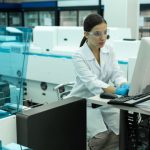
Applied and collaborative university-industry research: Open call for 2024 Industrial Doctorates
April 9, 2024
UPC will be at the Smart City Expo World Congress 2024
July 15, 2024
Applied and collaborative university-industry research: Open call for 2024 Industrial Doctorates
April 9, 2024
UPC will be at the Smart City Expo World Congress 2024
July 15, 202424/05/2024
From May 21 to 23, the UPC, through CIT UPC, participated in the latest edition of the IoT Solutions World Congress. Held at the Gran Via venue of Fira de Barcelona, the University showcased projects, technological solutions, and expert knowledge to address current challenges in the Internet of Things across various fields.
Once again, the Universitat Politècnica de Catalunya - BarcelonaTech (UPC) participated through CIT UPC in the IoT Solutions World Congress (IoT SWC), the international event on industry transformation through disruptive technologies. At booth 80 (Hall P1, Level 0, Street D, Booth 17), three prototypes developed in the realm of the Internet of Things (IoT) were displayed, along with other projects and technologies in areas such as connectivity, digital twins, security, Industry 4.0, Big Data, energy efficiency, and e-Health.
Initiatives related to technology and knowledge transfer and talent acquisition were also presented, fostering collaborative relationships between the university and industry and creating new learning ecosystems to train digital specialists.
The technological prototypes showcased at the UPC booth included:
- ETEXHEALTH: Smart textiles for health sector applications. This project by the Radiofrequency Identification and Flexible Electronics (RFLEX) group at UPC focuses on solutions based on electronic textile sensors (e-textile) to monitor biometric variables of the human body and disease progression in a minimally invasive way.
- Reliable and Resistant Ammonia Detectors: Aiming to improve animal welfare and reduce production costs in farms. Researchers from the Micro and Nano Technologies for Solar Energy (MNT-Solar) group at UPC, in collaboration with the MINOS group from the Universitat Rovira i Virgili, are working on the reliable, high-performance, and low-cost production of ammonia sensors for livestock. These sensors are based on nanostructured metal oxide layers technology.
- LoRaMesher: Advanced IoT services for LoRa mesh networks. This is the first open-source library enabling multi-hop and peer-to-peer data routing in a LoRa mesh communication network. Developed by the Computer Networks and Distributed Systems (CNDS) research group, it implements a data routing protocol that allows IoT applications to interconnect over LoRa wireless communication technology. IoT devices connected by LoRa form a mesh network, enabling communication between nodes, similar to the Internet.
In addition to these prototypes, information on disruptive technologies addressing specific challenges was provided. Projects such as Assolim (optimized routes on demand for the catering sector), GIRASOL II (digital twin of photovoltaic solar plants), ModpoW (AI for detecting soil water response), CULTISENSOR (agricultural detection machinery for mapping physical soil conditions), and sensQ (UPC technology to homogenize and improve quality control of fermentation processes in the agri-food sector) were highlighted.
Two patented technologies were also presented: a high-performance electromagnetic vibration energy harvester and a data modulation method for commercial Wi-Fi transmitters to communicate with non-Wi-Fi IoT devices. Additionally, two spin-offs from the UPC offering IoT solutions, Datision and Nearby Computing, were showcased.
Reshaping University-Industry Collaboration
From the perspective of knowledge transfer and talent acquisition, other initiatives at the congress aimed to establish synergies between the University and industry, such as the INDUSAC Platform.
In the same vein, the MERIT project aims to develop a new pan-European educational ecosystem to train digital specialists with a significant market impact and help overcome the professional deficit in this field.
In this context, and within the framework of the congress, the session "Strategic Alliances between University and Industry: Technology and Talent for Innovation" was organized, moderated by Jordi Martín from CIT UPC. It took place on May 21, from 3:00 to 4:30 PM (Hall 2.1, Room A).
The session began with a dialogue with Carmen Borja, CTO of Fractus, a pioneering antenna company founded 25 years ago as a spin-off from UPC, showcasing a successful university-industry collaboration resulting in the creation of the Fractus-UPC Deep Tech Hub. The session continued with presentations of UPC solutions developed by researchers as examples of IoT transfer, such as an energy solution for Open Arms and projects like LoRaMesher, Kapture, Assolim, ModPoW, sensQ, ADRIANO, CULTISENSOR, and GIRASOL II.
The event concluded with a dialogue between Ilker Demirkol, professor at UPC (EPSEM Manresa) and coordinator of the MERIT project, and Eva Roca, Talent Iberia Manager at Schneider Electric, on new collaborative formulas to foster talent in emerging areas.
On May 22 at 1:40 PM, (Espai Àgora at the Barcelona Activa stand), Silvia Chellini, from Transfer and Innovation at CIT UPC, presented an overview of UPC's solutions in "The IoT Revolution: Transformative Projects in the Digital Era."
Related Projects
- The BIOsignal Analysis for Rehabilitation and Therapy (BIOART) research group at the Universitat Politècnica de Catalunya – BarcelonaTech (UPC) coordinates the Proactive Response and Efficient Planning with AI for Resilient Emergencies in hospitals (PREPARE) project, which aims to optimise hospital preparedness during emergencies through dynamic capacity and risk assessment using artificial intelligence (AI).
- A research team from the inLab FIB at the Universitat Politècnica de Catalunya - BarcelonaTech (UPC), together with the Asociación de Personas con Movilidad Reducida (AsoPMR), has taken part in the Spot4Dis project to enhance the mobility and autonomy of people with reduced mobility.
- The La Volta project foresees the construction of a large Catalan vault pergola within the Llars Mundet campus, in the Montbau neighbourhood (Horta-Guinardó district). This structure will become a new architectural landmark for Barcelona, combining traditional construction techniques with contemporary innovation. The project involves the Rehabilitation and Architectural Restoration Research Group (REARQ), at the Universitat Politècnica de Catalunya - BarcelonaTech (UPC), and is led by the Architects’ Association of Catalonia (COAC) and the Barcelona Provincial Council.
SATE-VEG: A system for energy renovation of buildings that helps reduce the urban heat island effect
Researchers from the Architecture, Energy and Environment (AiEM) group at the Universitat Politècnica de Catalunya - BarcelonaTech (UPC) have developed SATE-VEG, an external thermal insulation system with a vegetal coating that offers seasonally adaptive thermal behaviour, enhances urban biodiversity and promotes positive health effects. The system is made from organic materials, requires low maintenance and consumes minimal water.










